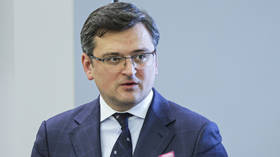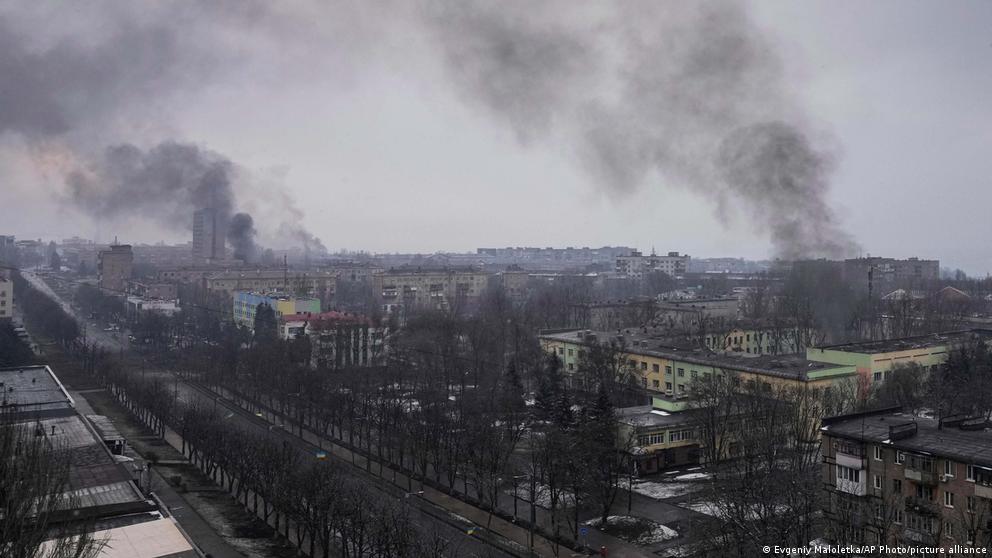•Says operation ends ‘in coming days’
•Ukraine needs more “weapons” to defend its own and Euro Atlantic security-Kubela
•US ‘flooding’ Ukraine with weapons-Russia
Either the Russian forces will reach their goals in Ukraine or Moscow and Kiev will reach an agreement in the near future, the Kremlin says
Moscow hopes the Russian military operation in Ukraine might end in the near future, possibly “in the coming days,” Kremlin spokesman Dmitry Peskov told Sky News on Thursday. Either the Russian troops will end it by reaching their military goals or Moscow and Kiev will reach an agreement through negotiations, he added.
The prospect of a peace deal would largely depend on the “consistency” of Ukraine’s position and its willingness to agree to Russia’s terms, Peskov said. He particularly said that those responsible for the crimes against civilians in the Donbass should be brought to justice.
When asked about accusations leveled by Kiev against Moscow over the alleged mass killings of civilians in the towns near Kiev, Peskov said that such claims are nothing but a “bold fake.”
“We deny the Russian military can have something in common with these atrocities and that dead bodies were shown on the streets of [the town of] Bucha,” the Kremlin spokesman told Sky News’ Mark Austin. “We are living in days of fakes and lies,” he added.
Russia is “interested in a really independent and objective investigation of all the crimes” committed in Ukraine, Peskov said.
According to Peskov, one of the goals of the Russian operation has been to avert a larger conflict, namely a potential World War III that would likely involve nuclear strikes. Should Ukraine join NATO and then try to seize Crimea through military means, NATO’s members possessing nuclear arms would have to defend it, he argued, adding that it would lead to a global conflict. Ukraine has been an “anti-Russian center” since 2014, the Kremlin spokesman said, adding that NATO is far from being a purely defensive military bloc as well.
“It’s not a peaceful alliance. It was tailored for confrontation and the main purpose of its existence is to confront our country,” Peskov has said.
Peskov’s interview immediately drew criticism from UK officials. British MP Tom Tugendhat, the head of the Foreign Affairs Committee, has branded the Russian spokesman’s words “lies [that] aren’t meant to be believed.”
Russia launched a large-scale offensive against Ukraine in late February, following Ukraine’s failure to implement the terms of the Minsk agreements signed in 2014, and Russia’s eventual recognition of the Donbass republics of Donetsk and Lugansk. The German and French brokered Minsk Protocol was designed to regularize the status of the regions within the Ukrainian state.
Russia has now demanded that Ukraine officially declare itself a neutral country that will never join the US-led NATO military bloc. Kiev insists the Russian offensive was completely unprovoked and has denied claims it was planning to retake the two rebel regions by force.
Ukraine warns of WW2 style battle
The country’s top diplomat told NATO that Kiev needs “weapons, weapons and weapons” to defend its own and Euro Atlantic security

Ukraine’s Foreign Minister Dmitry Kuleba @AP / Evelyn Hockstein
The scale of what he called the “battle for the Donbass” will make the world recall the Second World War, Ukraine’s Foreign Minister Dmitry Kuleba claimed on Thursday, calling on NATO to keep providing Kiev with “weapons, weapons and weapons.”
Speaking at a press conference in Brussels following a meeting with the US-led military bloc, Kuleba said that while fighting in the region has been ongoing, it has not yet reached “its maximum scale.”
“The battle for the Donbass will remind you, and I regret to say that but this is true, of the Second World War, with large operations, maneuvers, involvement of thousands of tanks, armored vehicles, planes, artillery. This will not be a local operation, based on what we see in Russia’s preparations for it. Russia has its plan, we have ours and the outcome of this battle will be decided on the battlefield,” Kuleba said.
The minister explained that he came to NATO headquarters with a simple agenda which had only three items on it: “weapons, weapons and weapons.” Kuleba argued that, as Euroatlantic security is “indivisible,” by fighting Russian forces Ukraine is defending not only itself but also bolstering the security of the bloc’s members.
“A fair deal that Ukraine is proposing is simple. You provide us with everything that we need, and we will fight for our security but also for your security so that [Russian] President [Vladimir] Putin will have no chance to test Article 5 of the North Atlantic treaty,” he said, referring to the provision about NATO collective defense in case of an assault from an adversary.
He emphasized that, in general, Kiev is content with the “overall dynamics” of how its relationship with its Western has evolved, while lamenting the “pretty high” price.
Kuleba’s remarks about a “Donbass battle” came a day after the Pentagon confirmed that Russian forces had cleared out of the Kiev region. Moscow declared plans to significantly pull back its forces from Kiev and Chernigov in late March, calling it a sign of “good faith,” as negotiations with Ukraine apparently moved an inch forward. At the same time, the Russian military made it clear that it had reached its objectives for the first stage of the Ukraine campaign and was preparing to focus efforts “on achieving the main goal – the liberation of the Donbass.”
Moscow attacked the neighboring state in late February, following Ukraine’s failure to implement the terms of the Minsk agreements signed in 2014, and Russia’s eventual recognition of the Donbass republics of Donetsk and Lugansk. The German and French brokered Minsk Protocol was designed to regularize the status of the regions within the Ukrainian state.
Russia has now demanded that Ukraine officially declare itself a neutral country that will never join the US-led NATO military bloc. Kiev insists the Russian offensive was completely unprovoked and has denied claims it was planning to retake the two regions by force.
The West responded to the Russian offensive in Ukraine by imposing tough wide-range sanctions on Moscow.
Russia accuses US of ‘flooding’ Ukraine with weapons
The Kremlin says supplying more armaments will not help peace talks

A Ukrainian soldier moves US-made Stinger air defense missiles at Boryspil International Airport near Kiev, February 2022. © Sergei Supinsky/AFP
Russia has said that Washington’s plan to send more weapons to Ukraine damages the chances of a successful peace process. Western countries have stepped up arms deliveries to Kiev since Moscow attacked the country in late February.
“Flooding Ukraine with weapons doesn’t contribute to the success of the Russian-Ukrainian talks. Instead, obviously, it will have a negative effect,” Kremlin spokesman Dmitry Peskov told reporters on Thursday.
Peskov’s statement came a day after the US Senate passed legislation that revives a World War II-era land-lease program allowing Washington to expedite the shipment of arms to Kiev. Ukrainian Foreign Minister Dmitry Kuleba thanked senators for their support and said he was expecting a “swift passage” of the bill in the House of Representatives.
The US announced on Wednesday that an additional $100 million will be directed at supplying Ukraine with more Javelin shoulder-fired anti-tank missile systems. Pentagon spokesman John Kirby said that 100 Switchblade kamikaze drones will be also delivered to Kiev.
NATO countries have been sending various weapons, including Soviet-era tanks and infantry fighting vehicles, to Ukraine, but refused to deliver aircraft, or set up a no-fly zone over the country, fearing an open war with Russia.
The sides held peace talks in Turkey late last month, during which the Ukrainian negotiators presented a roadmap for a potential deal to end the hostilities.
Moscow attacked the neighboring state in late February, following Ukraine’s failure to implement the terms of the Minsk agreements signed in 2014, and Russia’s eventual recognition of the Donbass republics of Donetsk and Lugansk. The German and French brokered Minsk Protocol was designed to regularize the status of the regions within the Ukrainian state.
Kiev says that the Russian offensive was completely unprovoked and has denied claims it was planning to retake the two republics by force.
Credit | RT

